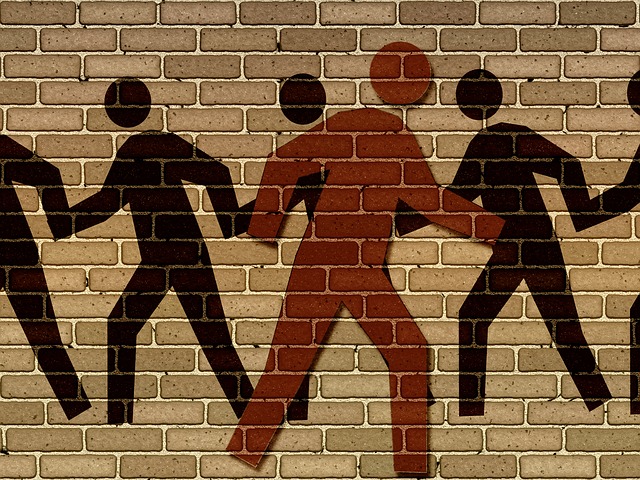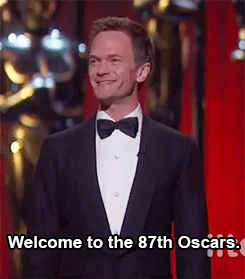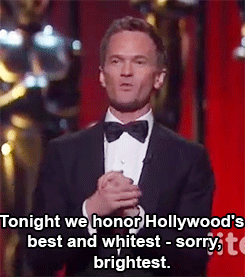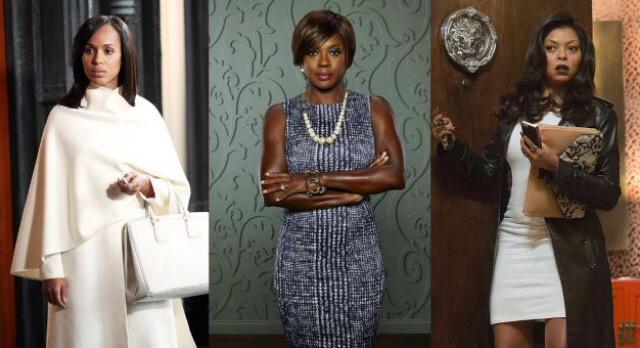
“That these people — these Others — are merciless, and can take any one of us whenever they choose.” — Sayid Jarrah, Lost
I.
At some point, they all awoke and got out of bed, maybe enthusiastically, maybe reluctantly. They showered, got dressed, ate breakfast and began their days. It is here that their stories diverge.
There is one who looked outside the window, saw someone unfamiliar-looking and felt anxiety well inside him or herself. It is a natural impulse, I think, for us to react to anxiety, for us to react broadly — to the point of stupidity — to this sensation, because we are desperate to defuse that anxiety. This one picked up the phone and complained about a suspicious person.
For every call, there’s a response: Police officers showed up post-haste and also regarded this same unfamiliar-looking one as an alien, capable of producing such anxiety that they shoved his feeble frame, putting him in the hospital and causing him partial paralysis.
There is another one who killed a woman, her sister, and her sister’s husband. He decided they caused him great anxiety. His wife said he had no hateful bones in his body.
Before either of these incidents, though, is someone. Or perhaps several someones. They determined that a 13 year-old boy was, by virtue of geography alone, so anxiety-inducing that they burned him alive. From 8,000 miles away.
In each of these instances, someone was motivated by violence to perform an act predicated on the simple assumption that a fellow human being had, somehow, ceased being a human — and had become something else. It is easy to hurt a fellow human being when you strip them of that humanity.
~
Last night, the 87th Annual Academy Awards was broadcast to millions of homes across the world — and under a heavy cloud of criticism stemming from a disturbing lack of diversity. It was so disturbing, so obvious, and so discussed that Neil Patrick Harris was quick to turn a joke on this fact early on in the telecast.


I think it is easy for people who have never felt the burden of being other-ed to make jokes like this; they do not realize that Oscar telecasts are the kind of platform that can change the hearts and minds of many people. It is the kind of humor that transforms scores of men and women into punchlines — almost as if the white hand of the Academy is swatting them back down. “Your concerns aren’t valid, sit back down.”
These are the kinds of jokes that make it clear that artists of color are considered as “others” — and that the status quo is content with widening the rift between the familiar and the other.
~
Robin.
Rohan.
Ronin.
Rowan.
Rogen.
Rowen.
From the time I entered grade school up until I was introducing myself to some stranger last week, most people always tried to fit their interpretation of my name into something that was familiar to them.
I understand that impulse — there is a lot about me that, if you subscribe almost exclusively to tropes and conventions dictated by American mass media, makes me seem very alien.
Then I say, “Hello.” I tell you what I do for a living and what the last movie was that I watched. You, even the most naïve and sheltered among you, will soon come to realize that I’m actually not all that different from you. In fact, if we were to draw a Venn diagram of things you and I have in common, I can list a whole bunch of things instantly: Watching television, sleeping in, extra vacation days, eating pizza, trying to save money, wanting to spend money, getting angry when someone in a restroom decides to pee all over the place without trying to aim for the toilet — and so on.
I always have this nervous lump in my throat that I have to swallow before introducing myself to strangers. I know they’re going to mangle my name. I know they’re going to prod, ask where my parents are from, ask if I speak any other languages, and lord, ask me to say something in that other language. I am terrified of being other-ed. I know my name, my skin color has likely played a deciding factor among hiring managers in the kinds of jobs in the magazine industry I’ve sought and never won. Every fourth or fifth match on Tinder always asks me what my ethnicity is, or remarks about how exotic my name sounds.
I’ve learned, through the years, to spit out the bitter pill.
I’ve adjusted pretty well to it.
II.
“I’ve adjusted pretty well to it.”
There was a lady who, on a New York City subway platform, felt a pang of anxiety, and pushed a man into a train. She saw it fit to act as a one-woman judicial review committee; she held this man accountable for the action of “terrorists.” The man who was pushed in front of a train was Bangladeshi man.
Probably not unrelated is that in 2012, it was revealed that the NYPD had begun spying on Bengali speakers. How auspicious that 2012 was the very year that I bid adieu to New York City, as well.
In my home state of Michigan, Bengali-speakers are part of a larger diaspora of Indian men and women who have become upwardly mobile, creating their own communities. I no longer had to tolerate a city where everyone, from magazine editors to local law enforcement, other-ed every aspect of my existence. Moving back home, in this sense, was a no-brainer.
Nobody should feel like their life is in risk because of the culture they were born into or the name their parents gave them.
~
When I think about the War on Terror, like most people I think of acts of aggression carried out against an abstract noun. Is terror defined narrowly as an act of aggression against people who are white or Americanized enough to pass as white?
Our news culture is quick to tell us that “terror” is only so when it has a brown or a black face, when it speaks a second language, has origin stories that can be traced across oceans to other lands. Our news culture equates “terror” with the other — and sells this problematic math wholesale to passive viewers.
Our news culture is quick to tell us that when the face of “terror” is a white man, he was misguided, a sad sack, mentally unstable, a lone wolf; he was frustrated by a parking dispute. When it is Tim McVeigh, James Eagan Holmes, Eric Harris, or Dylan Klebold, we are told it is because of violent video games and movies; it is the media’s fault. These men are impervious to blame. They are not held accountable for their actions. They are not monoliths for any community or race.
It is a wonder white men are not asked to step aside for security screening before entering a movie theater!
In fact, white men and women are not racially profiled; their names are not flagged on databases. They are not “randomly selected” by the NYPD to have their belongings searched. Their children are not traumatized by Orwellian pat-downs at the airport.
We joke about being racially profiled and other-ed because it is a traumatic experience that none of us ever truly gets over; we just develop stronger muscles to cope with it.
~
In 2009, I was attending Sarah Lawrence College for a Master’s program in Fiction Writing. On select days, I would shuttle into the city for an internship I had at a Lower Manhattan-based magazine. On more mornings than not, I would be “randomly selected” by the NYPD to have my belongings searched before I could swipe my Metro Card and board the 4 train. After a while, it stopped being so “random” and I would joke with my best friend that I should buy some Fair & Lovely skin-whitening cream so I could get to my internship on time.
Imagine being subjected to this when you’re already broke, trying to make it in the Big Apple, in a tremendous rush — and having friends tell you, “Oh, it’s not racism — they just have to be safe.”
I’ve adjusted well to this, too.
III.
Days have passed since the deaths of Yusor, Razan, and Deah.
We are not done grieving. Dr. Suzanne Barakat, Deah’s sister, has been touring the press, reminding them these people who have died are just that: They are people. They are not symbolic avatars of a religion, but human beings.
Barakat says, “We live in a time where today, it’s socially acceptable, it’s politically advantageous to demonize Muslims.”
In this statement, Barakat has identified the dangerous consequences of other-ing such a large swath of people — that if politicians demonize innocent individuals, civilians will follow their lead.
Yusor, Razan, and Death were taken from this world so cruelly — but they leave behind a vast network of other people who will have to learn and re-learn how to come to terms with this death.
It doesn’t end there; does it ever?
~
Days after, an arsonist set fire to an Islamic community center in southeast Houston with the suspect still at large. I immediately thought about the man who opened fire on a Sikh gurdwara in Wisconsin in 2012. I thought about a culture of individuals who are unable to utilize Google or Wikipedia — or even visit their local library — to learn about cultures that are different from their own, and about how these individuals grow bitter in their ignorance. This is dangerous.
Around the same time as the Houston arson, at a supermarket in Dearborn, Michigan, home to one of the largest Muslim populations in the U.S., men attacked a father of two, blaming him for the actions of the terrorist group ISIS. They verbally assaulted his young daughter. They threw punches. One of the supermarket employees allegedly held the father of two down so the white men could land blows on him. The man’s son tried to prevent the altercation; the daughter became hysterical.
So what about that boy in Yemen who was not allowed to become a man because of an American man? That boy — his name was Mohammed Toiman al-Jahmi — had lost a father and brothers to drone strikes. So American men thousands of miles away had been smudging out his family.
If you don’t have to see the bodies or know the names — how much easier it is to get over the loss of a “Yemeni teenager” than “a boy named Mohammed Toiman al-Jahmi”? — it becomes easier to engage with violence.
~
Sureshbhai Patel was identified as a “skinny black man” by an anonymous caller in a 911 recording. It was that description that prompted Officer Eric Parker to ask Patel what he was doing in the neighborhood, where he lived. Patel responded with, “No English,” and tried to produce the phone number of his son, who did speak English. At this point, Parker assaulted Patel and paralyzed him.
This is terrifying.
This is terrifying because many of us, as first- or second-generation South Asian Americans, have aging parents or grandparents that live with us. My grandmother goes for walks around the neighborhood all the time. It is her way of trying to learn the intricacies of a foreign community which she will never wholly understand. It is her way of enjoying the trees, the fresh air; and as someone who doesn’t drive in a city where you need to be able to drive to get anywhere, it is her way of feeling mobile.
To think that a poorly-trained police officer could put her life in jeopardy makes me want to ask her to never leave the house again unless she is chaperoned.
But that is not fair to her.
You know what else isn’t fair? Saying that Parker’s treatment of Patel “did not meet the standards.” Why not characterize Parker as monstrous? Why not call for a wholesale retraining of that police force?
Then, a follow-up question to the mainstream media which will likely go unanswered: Why not characterize Craig Hicks as monstrous?
~
“Skinny black man.”
Everything about Parker’s assault on Patel is terrifying because it is a gut reaction one man can have upon seeing another man who does not look or act like him.
These are three words that resulted in Sureshbhai Patel’s hospitalization. three words that connect this spate of attacks on brown people to a string of tragedies in 2014 where America mourned the loss of Mike Brown, Eric Garner, Renisha McBride, Gabriella Naverez, and Trayvon Martin, among too many others. Three words that, when decoded, betray personal bias of the person deploying these three words. In this case, these are three words that betrayed the racism, the prejudice of a citizen calling 911.
They are also three words that — when interpreted by the 911 operator and Officer Parker — pulled the veil back on just how deep racism runs in American communities. Imagine if, in an ethnic community, an anonymous caller complained about a “skinny white man” acting suspicious — the caller would’ve been gaslighted and her complaint not passed onto law enforcement.
Patel’s story is a little bit different — hailing from another global superpower, and one with strong political ties to the U.S. — the assault on him meant that the governor of Alabama had to personally apologize to the Indian government. All this and yet, nothing so succinct from our own government in response to Chapel Hill — or even Ferguson, for that matter.
~
To other men and women is a reactive impulse. We only other people when they fit into a subjective framework — and it is a framework that is shaped by fear. I fear Eric Parker; I fear Craig Hicks; I fear Darren Wilson; I fear George Zimmerman.
I fear a man who — opening his door to find someone as distressed as Renisha McBride, asking for help — would instinctively shoot her.
I fear a man who could sip his coffee and sentence an innocent Yemeni boy to die, thousands of miles away, with the push of a few buttons. This fear then creates a framework by which I end up other-ing these individuals — and in doing so, I end up demonizing them, characterizing them as “monsters.”
It’s a double-edged sword, because now I’ve failed at considering the humanity of these individuals. I’ve other-ed them. Where exactly do we draw the line?
IV.
This thoughtless smudging of lives — and the fact that citizens and government officials alike are complicit in it — happens not coincidentally by cultural programming. It is why people of color crow about wanting to see more people of color because dammit, we want white people to stop other-ing us. We are no longer your sidekicks, your magical problem-solvers, your maids, your exotic object of curiosity, your two-episode guest arc tokens, your cruel despots, your abstract plot obstructions. We have stories — and if you help us tell our stories, the dwindling status quo might stop other-ing us.

We laugh at the high camp value of dramas like Empire, Scandal, and How to Get Away With Murder. We do so while realizing what Lee Daniels and Shonda Rhimes are doing with checkered success: They are changing codes. They are fighting for a future where people of color, especially black people, do not get othered. With Cookie Lyon, Olivia Pope, Annalise Keating, they are creating an American culture where black women shape, fix, and manipulate the world around them. They are creating an American culture where Lucious Lyon and Rowan Pope are not anonymous murderers or drug dealers — they are brokers of power. They create an American culture where white people are supporting players.
About damn time, too.
We tweet furiously about Fresh Off the Boat because Asian Americans are not ninjas or set dressing in Quentin Tarantino films. We fall instantly in love with Jessica Huang because she is an awesome mother — and not a Tiger Mom stereotype.

No matter how willfully The Good Wife writers try to marginalize Kalinda Sharma into a mystical desi role, fixing the problems of white people around her, we will celebrate her calculated coldness and her many nuanced affectations. We celebrate Tom Haverford or Mindy Lahiri on Parks and Recreation and The Mindy Project, because they are not defined by the color of their skin; they do not buy into the construct of the other.
And yet, when we look for representations of Muslim Americans, we still only see the broad, problematic strokes. In my recollection, the least othered representation came courtesy of Shoreh Aghdashloo as Dina Araz on 24 — as the matriarch of a terrorist sleeper cell. She was a character who got killed off-screen the minute she stopped being a terrorist. Sloppy writing still shapes cultural codes — and this is highly problematic.
We are furious that the 87th Annual Academy Awards snubbed art and artists of color, while celebrating American Sniper — and that they gloat about their lack of diversity by way of self-effacing jokes during the live telecast: Have they showed us their true hand?
If white people build a house for the others to live in and we do not move into it and instead build our own houses, then we cease being others.
~
I always try to connect the dots between the unnecessary loss of life back to cultural programming because most of us are educated by mass media like television.
It is not a bad thing. It only becomes problematic when passive viewers are only sold one story. When we are told certain films or artists are not the “best” when, objectively, it would seem they are.
When we are sold the myth of minority sidekicks and white heroes, we are asked to participate in the other-ing of a person. When we are asked to consider whether faith played a role in the death of a victim (it never does — a murderer wielding a murder weapon played that role), we are asked to participate in the other-ing of a person. When CNN asks us a dozen times in two days whether faith, not the murder weapon, played a role in the murder of three innocent and wonderful civilians, they are perpetuating the belief that the deceased are others, that being others predisposed them to murder.
V.
There is a trick we can use to not take the bait when being asked to other a fellow human.
It is a trick that writers sometimes use when they are convincing you something absurd or inconsistent with the world they’ve built is actually commonplace: They write it no differently than they would anything else in that work. When done well, it is the kind of trick that allows us to immerse ourselves in the mythologies of The Hunger Games or Harry Potter.
We notice when news outlets hesitate to humanize victims of color because it is inconsistent with how they report when victims are white. White victims get their names, backstories, and a compelling narrative that is played to death during a news cycle; victims of color are lucky to get their names and a sliver of a backstory during a ticker scroll.
Darren Wilson got a highly-publicized interview on ABC News; Brown’s family got no closure from a broken legal system.
It is why many of us sigh at the idea of mainstream media and take to Twitter instead to share our grief, to console one another, to form communities, to find solutions. It is terrifying that news outlets with tremendous reach perpetuate the same narratives that create a framework for a man like Darren Wilson to openly admit there was something “demonic” about Mike Brown — and not be held accountable for his murder.
There are inconsistencies with how news outlets report on aggressors: White aggressors are troubled; non-white aggressors are terrorists.
Break the code by looking at how facts are presented and omitted and you find that there is always bias. Someone is always being other-ed to serve a larger, pernicious purpose.
I go back to trends on primetime television because they are subtlety breaking age-old codes of cultural programming — and doing so at a rate that reflects real-time shifts in consciousness. Many may never outgrow their racism and biases — but we should not live in a world that accommodates to their antiquated attitudes.
~
We are all humans. We need to remember that. No matter how different from you a stranger’s name, skin color, life choices, customs are, both of you are running on similar scripts where you sleep, shower, eat, celebrate, mourn, work, vacation, live, breathe, and die. We’re all just bags of meat and bones and we all have only the lives we are afforded.
They might awake, get dressed, eat, go to work, and be merry like you and me — but perhaps the monsters are born the minute they decide to demonize another, and do so while spilling blood.
And perhaps the onus is on the rest of us to resist the temptation to other anyone and strive to see humanity in everyone.
Rohin Guha is an editor at The Aerogram. Follow him on Twitter, if you’d like.












